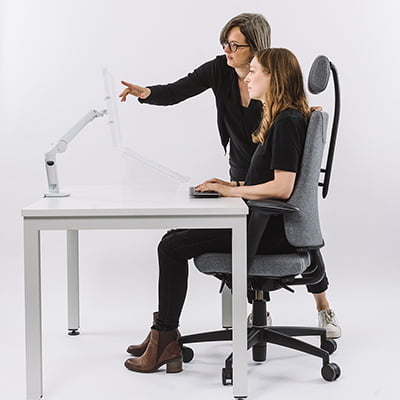Adapting to vision loss in the workplace: How Brighton Council’s Stephen Wraige enhanced his work environment with Posture People’s help with a workplace assessment to help with glaucoma. Stephen Wraige works in Housing Management for Brighton Council. In early 2022, he was diagnosed with glaucoma, an eye condition which affects the optic nerve. As a result, Stephen has experienced some sight loss and discovered that when he was working at his computer, he wasn’t able to see certain areas of his screen. Posture People were able to help with a specialised review of his workspace.
Why did you choose to have a workplace assessment?
Stephen says, ‘I wasn’t hugely affected by my diagnosis, except for certain areas of my vision. For example, I noticed that if there was a very long list on a document, the top of the list might ‘disappear’ from view, and I couldn’t see it without moving my head around. I didn’t know if anything could be done to help in terms of my computer or the equipment I was using, but I decided it was worth checking. In the past, I have used Posture People for Display Screen Equipment (DSE) assessments for my team members. For example, if someone had a bad back or there were concerns about shoulder or wrist pain and so on,
Posture People has helped with more detailed assessments with the staff. As the experts in their field, they can recommend what’s needed. This might mean a particular chair or a height-adjustable desk, that kind of thing.
What happened in the assessment?
It’s possible to have these sessions online, but it’s even better if the workplace assessment for glaucoma can be done face-to-face. This time, Roz came to see me from Posture People. She looked at my chair setup and desk height and measured where my hips and arms needed to be. She looked at the area I sat in and assessed the lighting to see if I needed something different because of the glaucoma and how the glare of the lights might make a difference. In addition to this, I often sit cross-legged at my desk, and I’ve been getting some hip pain as a result of that.

Were there any surprises?
I think that talking this through with someone makes you far more aware of how you’re sitting. It brings it to your attention and makes you more mindful of what it is you might be doing wrong. Also how this might have a knock-on effect on the rest of your body.
The recommendations were to use desk raises at work and at home (where I work part of the time). They also recommended a larger screen which has made quite a big difference and means I’m moving my head around less. They advised regular screen breaks and not over-using my eyes. Although glaucoma can’t be cured, I have eye drops, used daily, which relieve the pressure and prevent the condition from getting worse and with the combined larger screen, more breaks and a change in desk height, I’ve noticed quite a difference after the workplace assessment for glaucoma.
She also advised a new chair. We took a walk around the building to find a chair I could nab! Resources in a local council are relatively scarce, so it’d be great if we could find a chair that works without additional spending. I’m glad to say we found one and my posture is better for it. I’ve also tried not to cross my legs so much – but it’s hard to unlearn when it’s your muscle memory, and you’ve learned the habit over many years!
Office wellbeing
‘Fortunately, the Council is very supportive if we need additional support; if a staff member has an injury or is feeling discomfort at their workstation, they will ensure we have our workstation appropriately assessed.
I would advise anyone concerned about the effects of working with a medical condition – in my case, glaucoma – to have a workplace assessment. At the very least because it makes employers aware of it. Brighton Council is good at taking staff welfare seriously, but if someone reading this has an employer who doesn’t seem to care, or isn’t responsive, try going to HR. If that fails (or maybe you don’t have an HR department), go see your GP and ask for a letter to give to your employer. It carries a lot of weight as employers are compelled by law to ensure their employees are looked after and have the correct equipment they need to do the job. Get all the advice and support you can.
If you would like to talk to our team about how a workplace assessment for glaucoma or just an ordinary workplace assessment can be good for your business please call us on 0330 332 0880.

Ally Oliver is a journalist and editor for national press. She was previously the editor of Fit & Well magazine and has written about health and fitness for the Telegraph. In a previous life, she interviewed a broad spectrum of celebrities about their diet and health and could probably tell you why no one should ever do the cabbage soup diet.




